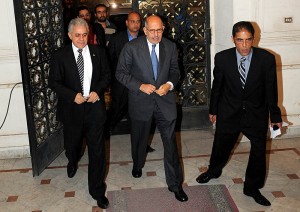
The National Salvation Front (NSF), a coalition formed to combat President Mohamed Morsy’s constitutional decree and the referendum on the constitution, was not able to meet its goal. The charter passed with a 64 per cent majority of the 32 per cent who bothered to vote.
The 36 per cent that voted “No,” however, must not be underestimated. This is an achievement for a country that usually says “Yes” to anything put forward by the powers in place. Additionally, the secular opposition is finally united. If it stays this way, the coalition could achieve a parliamentary majority.
That is a big “if,” since the alliance is quite loose and has been marred with controversy from day one. Many younger members of the revolutionary parties and groups inside the NSF are unhappy with the inclusion of former regime loyalists.
One of the NSF’s three main leaders is Amr Moussa, Mubarak’s foreign minister for ten years and Arab League Secretary General for ten more under the former president’s approval.
Moussa, a former presidential candidate, has a support base beyond feloul. In the eyes of other NSF leaders he represents segments of Egyptian society that must not be alienated, namely those who did not necessarily support the old regime but oppose the Islamists and those who were previously politically apathetic.
Still, the youth of the liberal and leftist parties making up the NSF might insist on cutting loose Moussa and others they deem feloul. The NSF announced it would contest parliamentary elections on one unified list, but the youth might refuse to do so.
The leaders of the NSF have only two choices: convince their youth cadres that secular unity in the face of rising Islamism is a must if the revolution is to succeed and that Moussa is “not so bad” (the man is hardly Shafiq), or capitulate and “purify” the NSF before contesting the elections. Whatever the coalition leaders decide to do, they need to decide fast; delaying this issue could lead to disorganisation that could cost them the election.
Another threat to the opposition unity is the deep ideological differences between the groups making up the coalition. “Oh, factional in-fighting? What else is new on the left?” a wise man once asked.
The ideologies inside the coalition range from classic liberals who fully believe in the free market, to Nasserists and socialists that are anti-capitalism, and everything in between. Economic policy is not the only dividing factor as well; some parties in the NSF could be identified as secular social conservatives, although these are in the minority.
Front leaders Moussa, a liberal, Hamdeen Sabahy, a left-wing Nasserist and Mohamed ElBaradei, a social democrat, have created a united agenda since the NSF’s conception. If this oneness carries on then ideological differences could put aside, at least until the elections are over.
The single most divisive issue, however, will be seat allocations. If the NSF plan to run on one list then parties inside inside the Front cannot contest seats against each other. There must be collaboration and coordination between parties to place the different party candidates in the appropriate areas.
The older parties such as Wafd could carry a strong voice on this issue, demanding more seats due to seniority and electoral success. Parties that contested last year’s parliamentary poll such as the Free Egyptians Party and the Egyptian Social Democratic Party may also demand an allocation of at least the amount of seats they won last time.
But this system will not work for newer parties like ElBaradei’s Dostour and Sabahy’s Popular Current (itself a coalition of parties) since they have no previous record of electoral success. It would be unwise to grant these parties a small allocation, however, as they are seen as some of the largest and most effective parties.
If, and only if, the NSF manages to get past these three issues, they will have a decent shot at winning a majority of the parliamentary seats. The Muslim Brotherhood and other Islamists combined were only able to mobilise 20 per cent of eligible voters in the referendum, and while NSF only got 12, this leaves 68 per cent of voters that remain to be allotted to either side.
If NSF can convince only over half of them (39 per cent) while retaining the 12 per cent it received during the referendum, it will have a parliamentary majority. The Islamists may be divided, but if no one gets a majority they will surely form a coalition government. The two-thirds required to amend the constitution is most probably out of reach for the NSF this time around, but a parliamentary majority? Doable.
